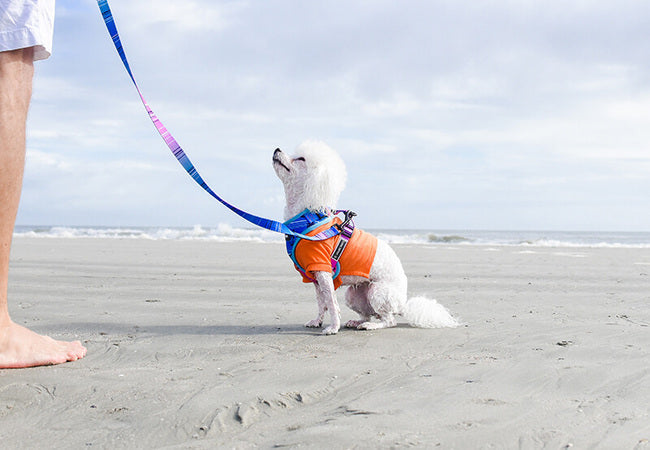Beach Safety 2025: 10 Must-Know Tips for Dogs 🐕🏝️

In this article
🏖️ 10 Essential Safety Tips for Taking Your Dog to the Beach in 2025 🐾
By Dr Duncan Houston BVSc
Taking your dog to the beach can be a delightful experience for both of you. However, the sun, sand, and surf come with potential hazards. To ensure a safe and enjoyable beach outing in 2025, consider these ten essential safety tips:
1. 🌞 Avoid Peak Sun Hours
Overview: The sun's intensity is highest between 10 a.m. and 4 p.m., increasing the risk of heatstroke and sunburn for your dog.
Tips:
- Plan beach visits during early morning or late afternoon.
- Provide ample shade using umbrellas or tents.
- Ensure your dog has access to fresh, cool water at all times.
2. 💧 Prevent Dehydration
Overview: Dogs can become dehydrated quickly, especially in hot environments.
Tips:
- Bring a portable water bowl and offer water frequently.
- Monitor for signs of dehydration: excessive panting, lethargy, dry gums.
- Encourage short breaks in the shade to cool down.
3. 🧴 Use Dog-Safe Sunscreen
Overview: Dogs, especially those with short or light-colored coats, are susceptible to sunburn.
Tips:
- Apply pet-safe sunscreen to exposed areas like the nose, ears, and belly.
- Avoid sunscreens containing zinc oxide or para-aminobenzoic acid (PABA), which are toxic to dogs.
- Reapply sunscreen after swimming or every two hours.
4. 🏊♂️ Ensure Water Safety
Overview: Not all dogs are natural swimmers, and ocean currents can be unpredictable.
Tips:
- Introduce your dog to water gradually in a controlled environment.
- Use a well-fitted canine life jacket, especially for inexperienced swimmers.
- Supervise your dog at all times while in the water.
5. 🐾 Protect Paws from Hot Sand
Overview: Sand can become extremely hot, leading to burned paw pads.
Tips:
- Test the sand's temperature with your hand before allowing your dog to walk on it.
- Use protective booties if necessary.
- Provide shaded rest areas to prevent prolonged contact with hot surfaces.
6. 🦠 Avoid Contaminated Water
Overview: Stagnant pools and certain ocean areas may harbor harmful bacteria and parasites.
Tips:
- Prevent your dog from drinking seawater or from stagnant pools.
- Rinse your dog with fresh water after swimming to remove salt and potential contaminants.
- Consult your veterinarian about vaccinations for waterborne diseases like leptospirosis.
7. 🐛 Be Aware of Parasites
Overview: Beaches can expose your dog to fleas, ticks, and other parasites.
Tips:
- Ensure your dog is up-to-date on flea, tick, and heartworm preventatives.
- Check your dog for ticks after beach visits, especially if they've been in grassy or wooded areas.
- Consult your vet about appropriate parasite control measures for your region.
8. 🧸 Choose Safe Toys
Overview: Some toys can collect sand or break apart, posing ingestion hazards.
Tips:
- Opt for durable, non-porous toys that don't trap sand.
- Avoid soft toys that can easily tear or become waterlogged.
- Regularly inspect toys for damage and replace them as needed.
9. 🚫 Prevent Sand Ingestion
Overview: Ingesting sand can lead to gastrointestinal blockages, a condition known as sand impaction.
Tips:
- Discourage your dog from digging or eating sand.
- Monitor for signs of sand ingestion: vomiting, lethargy, abdominal discomfort.
- Seek veterinary attention if you suspect your dog has ingested a significant amount of sand.
10. 🐚 Watch for Beach Hazards
Overview: Beaches may contain sharp shells, broken glass, or other debris that can injure your dog.
Tips:
- Inspect the area for hazards before allowing your dog to roam.
- Keep your dog leashed in unfamiliar or crowded areas.
- Carry a basic first-aid kit to address minor injuries promptly.
📱 Enhance Your Dog's Beach Experience with Technology
Modern tools can assist in ensuring your dog's safety and enjoyment at the beach:
- Ask A Vet App: Access expert veterinary advice and schedule consultations conveniently.
- Woopf: Utilize training resources tailored to your dog's breed and behavior.
- Purrz: Monitor your dog's activity levels and set reminders for health check-ups and grooming schedules.
🎯 Conclusion
Beach outings can be a wonderful way to bond with your dog. By following these safety tips, you can ensure that your beach adventures are both fun and safe for your furry friend.
For personalized guidance and support, visit AskAVet.com and download the Ask A Vet app today! 🐾📲






